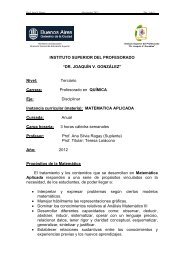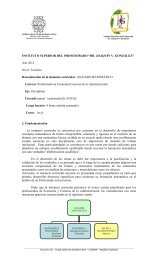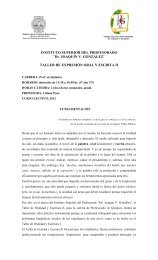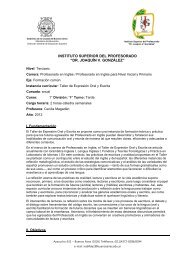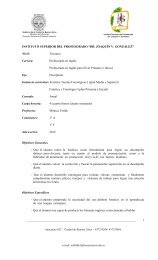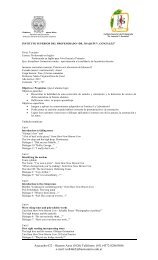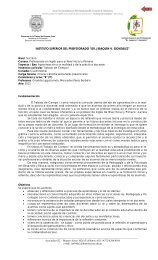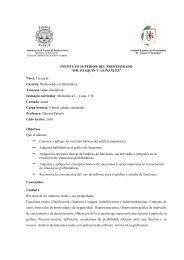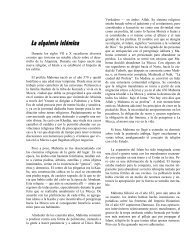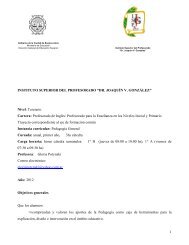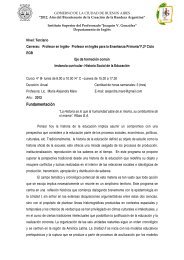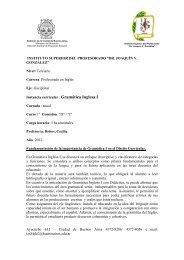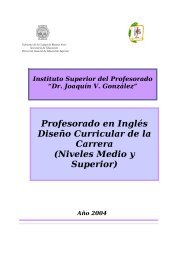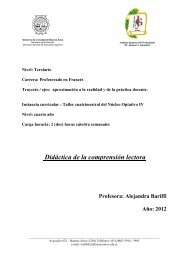Los retos de la historia oral en el siglo XXI: diversidades ...
Los retos de la historia oral en el siglo XXI: diversidades ...
Los retos de la historia oral en el siglo XXI: diversidades ...
Create successful ePaper yourself
Turn your PDF publications into a flip-book with our unique Google optimized e-Paper software.
Sesiones parale<strong>la</strong>s / Parall<strong>el</strong> sessionst<strong>en</strong><strong>de</strong>r los <strong>de</strong>safíos, los límites, <strong>la</strong>s <strong>historia</strong>s que <strong>la</strong> mo<strong>de</strong>rnidad provocó <strong>en</strong> <strong>la</strong>vida <strong>de</strong> estas mujeres. En este contexto, esta investigación es una r<strong>el</strong>ectura<strong>de</strong> <strong>la</strong> <strong>historia</strong> <strong>de</strong> <strong>la</strong> ocupación y <strong>la</strong> organización social <strong>de</strong> los as<strong>en</strong>tami<strong>en</strong>tosrurales <strong>en</strong> esta región, a través <strong>de</strong> <strong>la</strong>s trayectorias individuales y colectivas <strong>de</strong><strong>la</strong>s mujeres migrantes, y seña<strong>la</strong> que <strong>la</strong> construcción <strong>de</strong> los difer<strong>en</strong>tes espaciossociales <strong>en</strong> <strong>la</strong> frontera fue e está marcado por <strong>la</strong> pres<strong>en</strong>cia <strong>de</strong> <strong>la</strong>s mujeres. T<strong>en</strong>i<strong>en</strong>do<strong>en</strong> cu<strong>en</strong>ta también que <strong>la</strong>s trayectorias <strong>de</strong> <strong>la</strong>s mujeres migrantes “brasiguayas”<strong>en</strong> <strong>la</strong> lucha por <strong>la</strong> tierra están ca<strong>la</strong>das por <strong>la</strong>s interv<strong>en</strong>ciones obligatoriasy <strong>la</strong>s acciones que dieron forma al proyecto <strong>de</strong> colonización <strong>de</strong> estaregión, <strong>en</strong> este trabajo son <strong>la</strong>s voces <strong>de</strong> estas mujeres que estarán <strong>en</strong> evi<strong>de</strong>ncia,contando <strong>la</strong> <strong>historia</strong> <strong>de</strong> <strong>la</strong> ocupación y <strong>de</strong> <strong>la</strong> organización <strong>de</strong> este territorio,sus experi<strong>en</strong>cias y re<strong>la</strong>ciones <strong>de</strong> género vividos por <strong>el</strong><strong>la</strong>s y sus familias <strong>en</strong> estacoyuntura <strong>de</strong> <strong>la</strong> construcción <strong>de</strong> <strong>la</strong> migración, <strong>la</strong> ocupación y <strong>la</strong> reconstrucción<strong>de</strong> otros espacios sociales. Por lo tanto, es <strong>la</strong> contribución efectiva <strong>de</strong> <strong>la</strong> mujer<strong>en</strong> <strong>la</strong> construcción y mant<strong>en</strong>imi<strong>en</strong>to <strong>de</strong> <strong>la</strong> vida, tanto <strong>en</strong> <strong>la</strong> familia como <strong>en</strong> <strong>el</strong>proceso migratorio, <strong>de</strong> manera colectiva, que ori<strong>en</strong>ta este trabajo.This paper aims to analyze the migration of rural wom<strong>en</strong> in the bor<strong>de</strong>r regionwith Paraguay, who together with their families joined in a project of colonizationand national <strong>de</strong>v<strong>el</strong>opm<strong>en</strong>t, conducted by the Fe<strong>de</strong>ral Governm<strong>en</strong>t ofthat country in the sev<strong>en</strong>ties, so we try to un<strong>de</strong>rstand the chall<strong>en</strong>ges, limits,the stories that the mo<strong>de</strong>rnity caused in the lives of these wom<strong>en</strong>. In this context,this research is a rereading of the history of occupation and social organizationof rural settlem<strong>en</strong>ts in this region, through individual and collectivepaths of migrant wom<strong>en</strong>, noting that the construction of differ<strong>en</strong>t social spacesat the bor<strong>de</strong>r was and is marked by the pres<strong>en</strong>ce of wom<strong>en</strong>. Consi<strong>de</strong>ringalso the trajectories of migrant wom<strong>en</strong> “brasiguayas” in the struggle for <strong>la</strong>ndis pierced by the obligatory interv<strong>en</strong>tions and actions that shaped the projectof colonization of this region, in this work are the voices of these wom<strong>en</strong> whowill be in evi<strong>de</strong>nce, t<strong>el</strong>ling the story of the occupation and the organizationof this area, experi<strong>en</strong>ces and g<strong>en</strong><strong>de</strong>r re<strong>la</strong>tions experi<strong>en</strong>ced by thems<strong>el</strong>ves andtheir families at this juncture in the construction of migration, occupation andreconstruction of other social spaces. Therefore is the contribution effective ofwom<strong>en</strong> in the construction and maint<strong>en</strong>ance of life, both in the family and inthe migration process, collectiv<strong>el</strong>y, to gui<strong>de</strong> this work.MOREIRA, Vagner JoséLas fu<strong>en</strong>tes <strong>oral</strong>es y <strong>el</strong> trabajo <strong>de</strong>l <strong>historia</strong>dor <strong>en</strong> <strong>la</strong>explicación histórica: memorias y movimi<strong>en</strong>tos sociales<strong>de</strong> trabajadoresEn <strong>la</strong>s últimas décadas, <strong>el</strong> trabajo <strong>de</strong> investigación histórica ha cambiado <strong>de</strong>formato <strong>de</strong>bido al uso <strong>de</strong> difer<strong>en</strong>tes l<strong>en</strong>guajes como materiales históricos. Eltratami<strong>en</strong>to dado por los <strong>historia</strong>dores a los docum<strong>en</strong>tos los llevó a i<strong>de</strong>ntificary cuestionar <strong>la</strong>s propieda<strong>de</strong>s específicas <strong>de</strong> cada fu<strong>en</strong>te para maximizar<strong>la</strong>s posibilida<strong>de</strong>s <strong>de</strong> interpretación histórica. En Brasil, <strong>de</strong>s<strong>de</strong> esta perspectiva,y sigui<strong>en</strong>do <strong>la</strong> teoría y <strong>la</strong> metodología <strong>de</strong> Alessandro Port<strong>el</strong>li y Yara AunKhoury, se ha construido una tradición historiográfica anc<strong>la</strong>da <strong>en</strong> <strong>la</strong> reflexión<strong>de</strong> <strong>la</strong>s posibilida<strong>de</strong>s metodológicas <strong>de</strong> <strong>la</strong> <strong>historia</strong> <strong>oral</strong> y <strong>de</strong>l uso <strong>de</strong> <strong>la</strong> fu<strong>en</strong>te<strong>oral</strong> como docum<strong>en</strong>to <strong>en</strong> <strong>el</strong> trabajo <strong>de</strong>l <strong>historia</strong>dor. Entre <strong>la</strong>s diversas propieda<strong>de</strong>sespecíficas <strong>de</strong> <strong>la</strong> fu<strong>en</strong>te <strong>oral</strong> se han problematizado <strong>en</strong> <strong>el</strong> ejercicio <strong>de</strong><strong>la</strong> explicación histórica, <strong>la</strong> memoria, <strong>la</strong> <strong>oral</strong>idad y <strong>la</strong> subjetividad, mediadaspor <strong>la</strong> observación minuciosa <strong>de</strong> actos interpretativos, <strong>en</strong>redos, t<strong>en</strong><strong>de</strong>ncias,procedimi<strong>en</strong>tos narrativos y simbólicos. De esta manera, <strong>el</strong> objeto <strong>de</strong> <strong>la</strong> comunicaciónse construye <strong>en</strong> <strong>la</strong> problematización <strong>de</strong> <strong>la</strong> fu<strong>en</strong>te <strong>oral</strong> como materialhistórico r<strong>el</strong>evante para <strong>la</strong> compr<strong>en</strong>sión <strong>de</strong> los procesos históricos viv<strong>en</strong>ciadospor los individuos, cuyos resultados provi<strong>en</strong><strong>en</strong> <strong>de</strong> <strong>la</strong> tesis doct<strong>oral</strong> <strong>en</strong> HistoriaSocial que estudia <strong>la</strong>s propieda<strong>de</strong>s específicas <strong>de</strong> <strong>la</strong>s narrativas <strong>oral</strong>es y <strong>la</strong> experi<strong>en</strong>ciasocial <strong>de</strong> los trabajadores <strong>de</strong> Fernandópolis, región localizada al noroeste<strong>de</strong> São Paulo, Brasil. La investigación rev<strong>el</strong>ó procedimi<strong>en</strong>tos narrativos,<strong>en</strong>redos y actos <strong>de</strong> interpretación construidos por los individuos a partir <strong>de</strong> loscuales fue posible <strong>de</strong>sve<strong>la</strong>r <strong>la</strong>s luchas <strong>en</strong>tre los difer<strong>en</strong>tes proyectos políticosdireccionados para <strong>el</strong> campo y para <strong>la</strong> ciudad, así como discutir <strong>la</strong> disputa por<strong>la</strong> memoria <strong>de</strong> los movimi<strong>en</strong>tos sociales y por <strong>la</strong> memoria <strong>de</strong> los trabajadorescon trayectorias disi<strong>de</strong>ntes.RIVAS ONTIVEROS, José R<strong>en</strong>éLa her<strong>en</strong>cia histórica <strong>de</strong>l movimi<strong>en</strong>to estudiantil <strong>de</strong>1968 <strong>en</strong> México y los caminos <strong>de</strong> <strong>la</strong> izquierdaPese haber sido severam<strong>en</strong>te reprimido por medio <strong>de</strong> <strong>la</strong> fuerza pública, <strong>el</strong> movimi<strong>en</strong>toestudiantil <strong>de</strong> 1968 <strong>en</strong> México, a mediano y <strong>la</strong>rgo p<strong>la</strong>zo, fue un movimi<strong>en</strong>totriunfante, puesto que s<strong>en</strong>tó <strong>la</strong>s bases para que <strong>en</strong> <strong>el</strong> país se llevara acabo un proceso <strong>de</strong> transición a <strong>la</strong> <strong>de</strong>mocracia, así como por <strong>el</strong> fuerte impactoque tuvo <strong>en</strong>tre <strong>la</strong>s difer<strong>en</strong>tes corri<strong>en</strong>tes políticas e i<strong>de</strong>ológicas <strong>de</strong> <strong>la</strong> izquierdaque se han v<strong>en</strong>ido expresando <strong>en</strong> difer<strong>en</strong>tes ámbitos <strong>de</strong> <strong>la</strong> vida pública nacional,tales como los partidos políticos, los movimi<strong>en</strong>tos sociales, <strong>la</strong> vida académicay hasta <strong>en</strong> <strong>la</strong>s acciones armadas <strong>de</strong> carácter guerrillero.Despite being sever<strong>el</strong>y repressed by the police, the stu<strong>de</strong>nt movem<strong>en</strong>t of 1968in Mexico, in the medium and long term, was a triumphant movem<strong>en</strong>t, and bythe foundation for the country to un<strong>de</strong>rtake a transition to <strong>de</strong>mocracy, andby the strong impact among differ<strong>en</strong>t political and i<strong>de</strong>ological left that havebe<strong>en</strong> expressed in various areas of national public life, such as political parties,social movem<strong>en</strong>ts, aca<strong>de</strong>mic life and to in the armed actions of guerril<strong>la</strong>character.——————————————————————————————————————————————Subtema / Subteme 6Memoria, <strong>historia</strong> <strong>oral</strong> y dictaduras / Memory, OralHistory and dictatorshipsSa<strong>la</strong> Jacobo Laks - Mesa / Session 28Coordinan / Chair: DANIEL MAZZEI y M<strong>el</strong>isa SLATMAN——————————————————————————————————————————————ARÚJO, Maria Pau<strong>la</strong>Memory Tracks: <strong>oral</strong> history of amnesty in BrazilIn Latin America, over the past <strong>de</strong>ca<strong>de</strong>s, many countries have gone throughdiffer<strong>en</strong>t political transitions, going from being military dictatorships to <strong>de</strong>mocracies.A question has pres<strong>en</strong>ted its<strong>el</strong>f for society and the Governm<strong>en</strong>t in allof these countries: how to <strong>de</strong>al with this authoritative heritage? How to look tothe past and fit it into the new times, how can wounds be healed, how can th<strong>el</strong>egacy of viol<strong>en</strong>ce be suppressed?One <strong>el</strong>em<strong>en</strong>t has be<strong>en</strong> configured as crucial in all this political transition processes:the word. Revealing facts, making vio<strong>la</strong>tions public, reporting arbitrariness,remembering the struggles and resistance - all of this has p<strong>la</strong>yed a greatsymbolic and political role in the construction of a new pact in post-conflictsocieties. Oral history <strong>de</strong>als with testimonies, memory, life stories and that isprecis<strong>el</strong>y why it has p<strong>la</strong>yed a key role in this process. This work is a reflectionon the re<strong>la</strong>tionship betwe<strong>en</strong> <strong>oral</strong> history, memory and politics, consi<strong>de</strong>ring therole of testimony and words in the process of overcoming contexts of politicalviol<strong>en</strong>ceHOFSTÄTTER, MariliaEl movimi<strong>en</strong>to estudiantil <strong>en</strong> <strong>la</strong> ciudad <strong>de</strong> P<strong>el</strong>otas, através <strong>de</strong> <strong>la</strong> <strong>historia</strong> <strong>oral</strong>: 1978 - 1985This communication is int<strong>en</strong><strong>de</strong>d to accost various forms of performance of theuniversity stu<strong>de</strong>nt movem<strong>en</strong>t in the city of P<strong>el</strong>otas (Rio Gran<strong>de</strong> do Sul) in theperiod of political re<strong>de</strong>mocratization, from 1978 until 1985, during the civilmilitarydictatorship in Brazil. The discussion will be through interviews fromthe Oral History methodology combined with the conceptual fi<strong>el</strong>d of politicalhistory with the finality of perceive the new ag<strong>en</strong>da of the stu<strong>de</strong>nt movem<strong>en</strong>tduring the important period of political re-op<strong>en</strong>ing in Brazil, seeking consi<strong>de</strong>rthe issue of i<strong>de</strong>ntifying and c<strong>la</strong>ssify the stu<strong>de</strong>nt movem<strong>en</strong>t. The stu<strong>de</strong>nt movem<strong>en</strong>tis complex and multifaceted, what in some contexts does not prev<strong>en</strong>tthe ability to unite in <strong>de</strong>f<strong>en</strong>se of some schedules. From analyzes of Brazilianhistoriography, it is clear that in <strong>de</strong>aling with the topic the stu<strong>de</strong>nt movem<strong>en</strong>tduring the civil-military dictatorship, the greatest focus is on ev<strong>en</strong>ts that occurredaround the year 1968, which can cause a <strong>de</strong>valuation of other importantmom<strong>en</strong>ts . Thus, we int<strong>en</strong>d to discuss the interviews / docum<strong>en</strong>ts which wasthe <strong>de</strong>mand of the stu<strong>de</strong>nt movem<strong>en</strong>t in rec<strong>en</strong>t years of political repression, givingpriority to speak of social actors who participated in its historical process.Faced with these issues and prioritizing revived the memory of participantsof stu<strong>de</strong>nt movem<strong>en</strong>t in P<strong>el</strong>otas, seeking to appreh<strong>en</strong>d / analyze this historicmom<strong>en</strong>t t<strong>en</strong>sioned of Brazil.DINIZ, Larissa Raposo y VELÔSO, Th<strong>el</strong>ma Maria GrisiMemoria y posiciones <strong>de</strong> i<strong>de</strong>ntidad: informes <strong>de</strong>l activismo.estudiantil durante <strong>la</strong> Dictadura Militar <strong>en</strong><strong>el</strong> BrasilEn <strong>el</strong> Brasil <strong>de</strong> los años 60 <strong>de</strong>l <strong>siglo</strong> pasado, <strong>el</strong> presi<strong>de</strong>nte João Gou<strong>la</strong>rt concedíacada vez más espacio político para los trabajadores, estudiantes y organizacionespopu<strong>la</strong>res <strong>en</strong> g<strong>en</strong>eral, <strong>en</strong> contra <strong>de</strong> los intereses <strong>de</strong> <strong>la</strong> parte conservadora<strong>de</strong> <strong>la</strong> pob<strong>la</strong>ción, que temía que <strong>el</strong> país se convirtiera <strong>en</strong> socialista. Poco apoco <strong>la</strong>s Fuerzas Armadas se estaban organizando y preparando <strong>el</strong> golpe militarque tuvo lugar <strong>en</strong> 1964. La Dictadura Militar <strong>en</strong> Brasil duró 21 años. En este89



